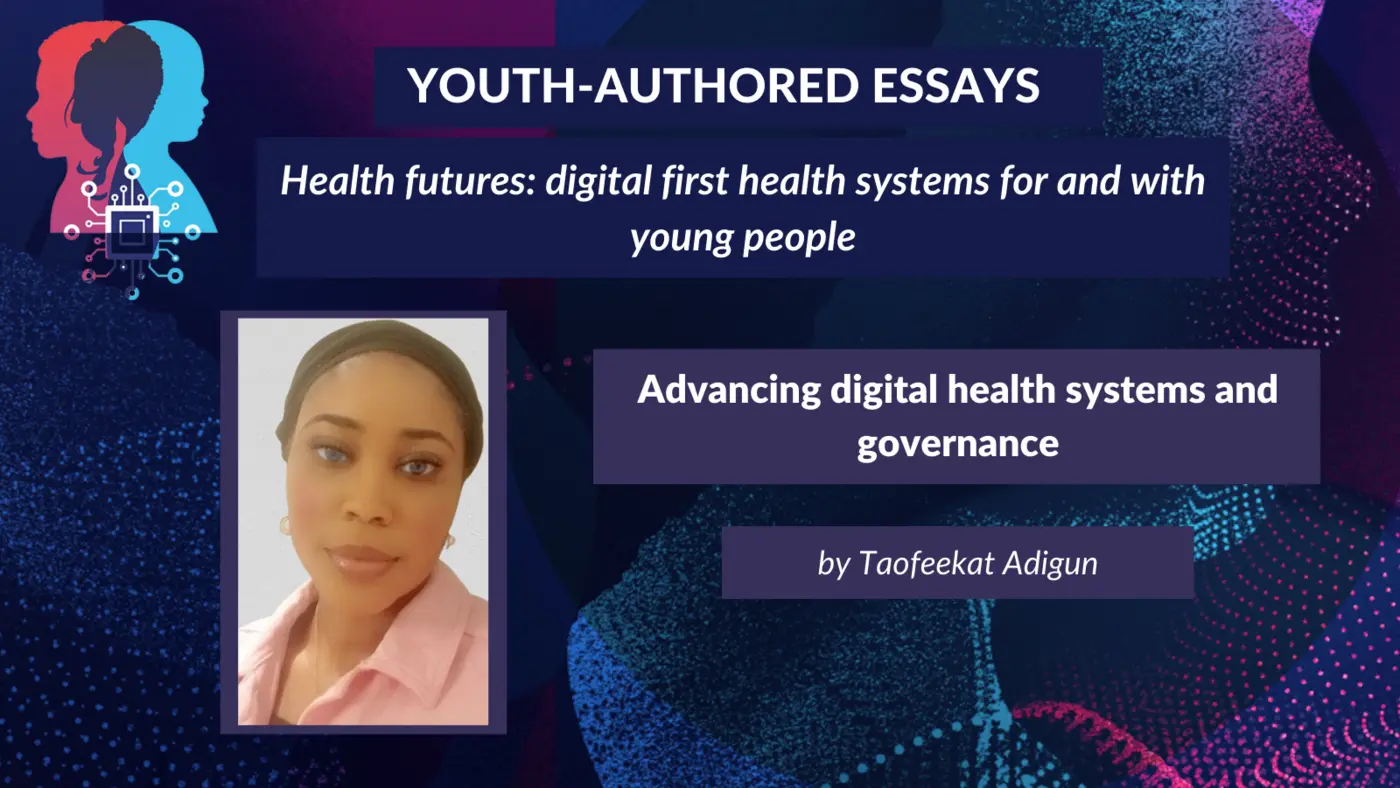This blog is part of a series of youth authored essays on Health futures: digital first health systems for and with young people. The views expressed in this blog are of the author and not of the Lancet and Financial Times Commission on Governing Health Futures 2030: Growing up in a digital world.
The digital revolution has demonstrably catalysed a fundamental shift in healthcare systems. With the pandemic speeding up the transition of the health ecosystem, public health emergencies have highlighted the need to build a strong digital foundation for the long-term sustainability of health and social care. Digital technology continues to dominate with a central role in improving healthcare services and delivery by utilising new technology and innovation, setting a pace for the digital revolution in advancing the digital health system.
As the Lancet and Financial Times Commission on Governing Health Futures 2030 highlights in its report, the governance of digital health underpins the leadership of digital technologies for health as well as the governance of how the broader digital transformations influence health outcomes and priorities. The digital era continues to be largely dominated by young people. Young people, with their digital literacy and online connectivity, continue to transform the digital narrative and have a higher tendency for exploring the potential opportunity in digital, web-based technologies, and/or apps to track their health and make informed health-related decisions. Prioritising young people in the governance of the digital health systems —which includes not only the application of digital technologies for health but the broader ways in which digital design, transformations, and governance can affect health systems and policy—is highly essential to optimise better health outcomes of young people for current and future realities.
Furthermore, young people continue to pioneer and set the bar for focused digital health and AI interventions in areas of digital health emergencies, pharmaceutical delivery, health screening, and telemedicine in Africa. Current digital and health landscapes utilise digital approaches including digitisation of health records in hospital administration, online health consulting services, telemedicine, health insurance plans, and more recently COVID-19 vaccination enrolment portals with digital vaccine certificates verifiable by QR codes – promising new levels of efficiency in patient care and changing the ways people receive health information and services.
As digital health increasingly appears as a promising and core component for accelerating progress toward universal health coverage (UHC) and other health goals, it also presents opportunities and challenges. The array of opportunities offered by digital transformation include increased access to healthcare, personalised treatment plans, better health outcomes, health promotion, and increased efficiency of health systems. Risks also include aggravating health inequities due to the prevalent digital divide and biases within health solutions, the proliferation of unregulated digital health tools, increased exposure to health misinformation, and threats to health information, data privacy, and security.

Priorities for responsive digital health systems in Africa
Prioritising a responsive digital health system must be the linchpin upon which design, transformation, and governance are based through:
Understanding and putting people’s needs at the core
Digital health is not a panacea to all health problems. Sometimes, modern technology makes healthcare more expensive, particularly in low-income countries, where not everyone can afford wearable devices or have access to smartphones. We need to evaluate and understand the health needs of underrepresented populations in creating affordable, tailor-made digital solutions to deliver effective and focused health services in equitable interventions locally and globally.
Bridging digital divides and disparities
Digital transformations continue to widen the digital divide and further exacerbate existing health and social inequalities. For example, the GSMA mobile internet connectivity reports 81% of people in developed countries using the internet, compared with 40% in developing countries and 15% in the least developed countries. It is critical to acknowledge the level of health literacy, local dynamics, social, cultural, and prevailing economic realities among other factors which shape how people are designing digital health solutions to improve their health.
As we are utilising technology in health care, we need to make sure that people are confident and supported in using it through digital literacy. Putting digital technology to work for people of diverse groups means relentlessly addressing online connectivity, affordability, accessibility, and policy support in inclusion and diversity of needs to create a sustained and equitable digital health system.
Integrating digital and non-digital interventions
Traditional models of healthcare delivery must not be ignored in the rush to tap into the buzz of digital transformation. Harmonising the fundamentals of healthcare intervention to complement and improve new digital solutions and existing healthcare solutions. Modern technological advances such as mobile applications or artificial intelligence may be hard to reach people due to health disparities. However, the use of traditional technology tools like simple text messaging, and radio and television jingles proved effective during the pandemic helping to reach people and impacting their health behaviour positively in Nigeria. Aligning health priorities with existing and emerging developments is essential to supporting plans for accelerating health programming scale and sustainability.
Centering young people in digital systems
As the digital generation, young people play a critical role in transforming digital health and supporting sustainable development. In particular, considering them not only as recipients but as key actors in planning, designing, and implementing innovations can shape digital health solutions. Equipping youth with the necessary resources, ethical guidance, and platforms can help to identify appropriate digital tools and youth-led solutions, tailor solutions according to people’s health needs and preferences and improve the reach and uptake of digital health solutions.
Embracing an inclusive process that involves youth and other marginalised groups at all stages of design, implementation, and governance, in digital health strategies is vital to optimise the health benefits of digital transformations.
Appropriate investments in innovative and inclusive solutions for digital health
An intricate understanding of the interaction of policy, workforce, health financing, and governance is needed to transform a healthcare system integrated with digital components and overcome barriers that aggravate health inequalities. With the varying levels of digital maturity in Africa, it is imperative to design and implement national digital health policies and strategies that fully reflect the positive or negative impact of digital health interventions on the health and well-being of different populations (including children, youth, and older populace) the forms of cross-sectoral and multi-stakeholder collaboration required to amplify or mitigate them and consolidating on existing health policies framework.
Expanding partnerships for the integration of health development and the digital ecosystem can boost the availability of digital health services, and delivery of services to hard-to-reach communities, aligning the health needs and priorities of communities and ensuring durable transformation across all levels.
Looking ahead, there are myriad opportunities in the coming years for vastly improved health outcomes, sustainable integrated health, and social care services, and reducing health disparities, if we prioritise youth perspectives, tackle the wider challenges of disparities and digital divides, synergise efforts across sectors and build on the progress of health landscape transformation for the future.

Taofeekat Adigun
Taofeekat Adigun is a public health and development specialist with consumable experience working at the intersection of policy, planning, advocacy, research, and digital engagement in areas of community health, civic participation, SRHR, and gender equality.
She has served on the Youth Leadership Board of the Global Youth Coalition. She is a fellow of the United Nations Academic Impact Millennium Fellow, Salzburg Global Seminar, Global Health Workforce Network of the World Health Organization (WHO), and One Health Tech. She works with the Ministry of Health, and currently leads the Center for Education, Social Health and Community Development (CESHCOD) advancing education, social, digital health agenda, and community engagement in Nigeria.
Twitter: @taoffy_gun
-
This author does not have any more posts.


